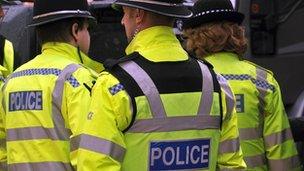Victim Support says few know of commissioner vote
- Published

The first elections for police and crime commissioners will take place on 15 November
There is a widespread lack of awareness about the flagship Home Office policy of directly-elected police and crime commissioners, a survey suggests.
Elections take place in November for individuals to oversee the running of 41 forces in England and Wales.
But in a YouGov survey of 2,400 people for the charity Victim Support, 82% of respondents did not know who their local candidates were.
The Home Office said a public awareness campaign would begin next month.
It said candidates would not be officially confirmed until next month, when ministers launch a public awareness campaign, including a website listing all those who are standing.
'Positive difference'
The commissioners will replace the current appointed police authorities, and have the power to determine budgets and hire and fire chief constables. They will also have powers to commission local crime reduction, community safety and victims' services.
The Victim Support survey revealed that fewer than one in five people (18%) thought the commissioners would make a positive difference to the support victims get.
It also showed that fewer than a quarter of people (23%) believed that victims would be a priority for the commissioners in practice.
It suggested that 91% of people thought that it was important police and crime commissioners (PCCs) listened to victims when carrying out their role.
The national charity wants PCC candidates to sign up to a manifesto ahead of the elections on 15 November, which contains five "promises" to victims, and to prove to the voting public that victims will be a priority.
They include being open and accountable to victims and witnesses; ensuring victims and witnesses "get the high quality help and support they need, when they need it", and making the police "more victim-focused".
'Witnesses first'
Victim Support chief executive Javed Khan said: "Our survey shows that most people don't know about PCCs, what they'll do or have little faith that they'll prioritise victims' needs.
"It's now time for PCC candidates to stand up and prove to the public that they are committed to victims."
Actress and knife crime campaigner Brooke Kinsella, whose brother Ben was killed in a knife attack, supported the campaign, saying: "I don't think anyone traumatised by crime should be left to fend for themselves.
"People should use their vote on 15 November to elect PCC candidates who will put the needs of victims and witnesses first."
The elections, part of the biggest shake-up of policing in England and Wales for almost 50 years, will herald the end of police authorities, which were established in 1964 to hold chief constables to account.
- Published17 August 2012
- Published16 March 2012
- Published15 February 2012